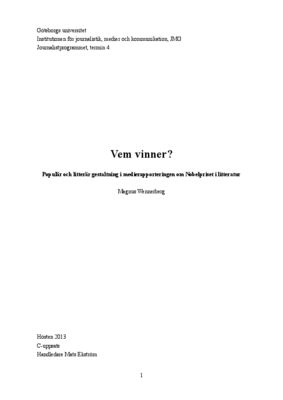Vem vinner?
Populär och litterär gestaltning i medierapporteringen om Nobelpriset i litteratur
The question at issue in this essay is how does mass media frame Nobel Prize in Literature? The starting point is to study whether game framing is occuring in media coverage of Nobel Prize in Literature. Previously, game framing has been studied in coverage of politcs, contrasted against issue framing. Game framing means that media frame politics as a game, a contest between politicians about power. This kind of framing is supposed to be used by media in purpose of attracting larger audience. In this essay the theory of game framing is applied in the new context of culture journalism. A theoretical basis primarily consisting of framing theory is used in this study, but also theory about media commercialization and theory about the dynamics between popular culture and high culture. The question if game framing is occuring in media coverage of Nobel Prize in Literature, is a question concerning journalism popularizing a high cultural institution. To exemplify Swedish mass media during the period from 1975 to 2011, two daily news papers are selected, the tabloid Aftonbladet and the morning paper Svenska Dagbladet. The tabloid is assumed to be a most likely case to apply game framing in reporting on Nobel Prize in Literature, while the morning paper is assumed to be a least likely case. Articles on Nobel Prize in Literature are analyzed by qualitative method primarily consisting of discourse analysis. The articles are studied with respect to three main forms of framing; literary framing, popular framing, and Nobel game framing.

